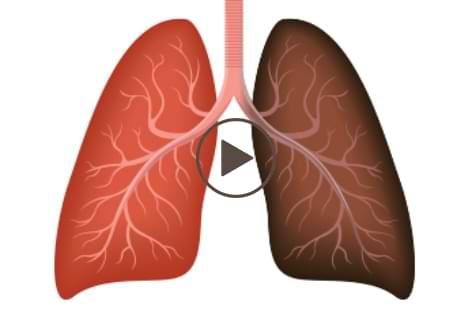
Vitamin E: A Breath of Fresh Air for Lung Health
Source: American Thoracic Society (2010)
Lifestyle Medicine Update (March 10, 2022)
Introduction:
This article explores the remarkable benefits of vitamin E supplementation in preventing chronic lung diseases, challenging the skepticism surrounding supplements. The research presented at the 2010 American Thoracic Society Meeting showcases vitamin E’s role as an antioxidant and its potential to reduce the risk of these diseases, even in women who smoke. This groundbreaking study sheds light on the tangible benefits of certain supplements, particularly vitamin E, in safeguarding lung health.
Exploring the Astonishing Benefits of Vitamin E Supplementation in Preventing Chronic Lung Diseases
When it comes to our health, the importance of vitamins and supplements often finds itself at the center of a heated debate. While some argue that they are nothing more than a placebo, others, like the researchers who presented their groundbreaking findings at the 2010 American Thoracic Society Meeting, are uncovering remarkable evidence that can’t be ignored. In this article, we delve into the captivating world of vitamin E and its role in protecting lung health, as well as debunking the myth that supplements are ineffective.
The Study That Left Experts Breathless
A pivotal moment in the realm of healthcare unfolded at the 2010 American Thoracic Society Meeting, where researchers unveiled the results of a comprehensive study that left the audience astonished. The study focused on vitamin E supplementation and its potential to combat chronic lung diseases, such as chronic bronchitis, emphysema, and bronchiectasis, specifically in women. Notably, this protective effect was observed even in women who smoked.
This extensive investigation drew upon the data gathered from the Women’s Health Study, which randomized 39,876 female healthcare professionals into two groups: one receiving 600 IU of vitamin E and the other a placebo (±100 mg aspirin) for nearly a decade. After excluding participants with pre-existing chronic lung diseases, the final analysis involved 19,299 women in the vitamin E group and 19,298 in the placebo group.
The jaw-dropping revelation was that vitamin E supplementation contributed to a substantial 10% reduction in the risk of developing new chronic lung diseases over the course of a decade. Remarkably, this benefit remained consistent even after accounting for various factors, including smoking, age, aspirin use, and dietary habits.
Unmasking the Power of Vitamin E
But how does vitamin E work its magic on lung tissue? The answer lies in its role as an antioxidant. Free radical damage, often induced by factors like cigarette smoke and air pollution, plays a significant role in the development of chronic lung diseases, including COPD (chronic obstructive pulmonary disease). Vitamin E, acting as a potent antioxidant, swoops in to protect the lungs from the ravages of these harmful free radicals.
While earlier observational studies hinted at a connection between antioxidants and a reduced risk of COPD, this research was groundbreaking in its scope and findings. The scientists noted that vitamin E could shield the lungs from damage caused by inflammation and free radicals. Interestingly, they speculated that part of this protective mechanism might involve the transport of vitamin E by high-density lipoprotein (HDL) into the lungs.
Moreover, the study hinted at the potential synergy between vitamins E and C. Combining these two vitamins in supplementation appeared to offer even greater protection for lung health than vitamin E alone.
Dispelling the Myth: Supplements That Make a Difference
In an era where skepticism surrounds the efficacy of vitamin supplements, this study shines a light on the tangible benefits they can offer. Contrary to the notion that supplements are mere placebos, the research presented at the 2010 American Thoracic Society Meeting demonstrates that certain supplements can indeed make a substantial difference.
Vitamin E emerges as a champion in the fight against chronic lung diseases. Even for smokers, the 10% reduction in disease risk is a powerful testament to its potential. While it’s crucial to prioritize not smoking or quitting for optimal lung health, vitamin E supplementation emerges as an ally for everyone, including non-smokers, seeking to safeguard their lungs from the perils of air pollution and other environmental threats.
In conclusion, the study presented at the 2010 American Thoracic Society Meeting highlights the potential of vitamin E supplementation in reducing the risk of chronic lung diseases in women, including smokers. This groundbreaking research challenges the skepticism surrounding the effectiveness of supplements and underscores the vital role vitamin E plays as an antioxidant in protecting lung tissue from the damaging effects of free radicals. It’s a reminder that in the pursuit of good health, certain supplements can indeed make a significant difference.
Reference:
- [Long-term vitamin E use prevents COPD in women. Medscape, May 17, 2010. (American Thoracic Society 2010 International Conference)](https://www.medscape.com/viewarticle/721905)
Dr. Meschino

Dr. James Meschino
ABOUT THE AUTHOR
Dr. James Meschino, DC, MS, ROHP, is an educator, author, and researcher having lectured to thousands of healthcare professionals across North America. He holds a Master’s Degree in Science with specialties in human nutrition and biology and is recognized as an expert in the field of nutrition, anti-aging, fitness, and wellness as well as the author of numerous books.


